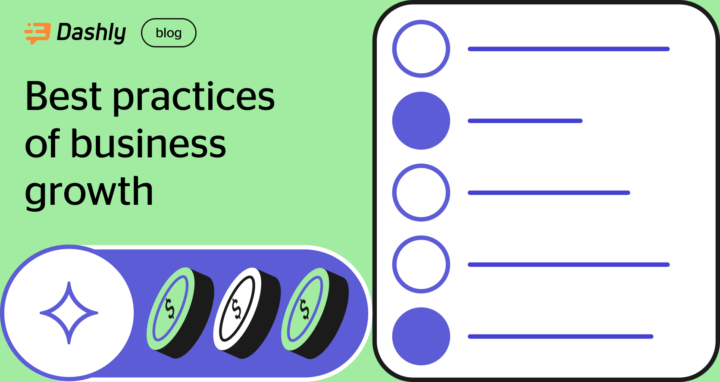Best AI email assistant tools for efficient communication

In today’s fast-paced business landscape, embracing cutting-edge technology is crucial for staying competitive.
Dashly, an AI-driven marketing platform, is transforming how businesses automate lead qualification and scheduling, helping them boost productivity and focus on strategic initiatives. AI email assistants, like Dashly, are at the forefront of this revolution, enhancing communication and reducing the burden of manual tasks. From automating responses to categorizing leads, these tools save time and empower professionals to make a greater impact.
Dashly showcases the transformative power of AI in communication by automating 90% of appointment booking processes for MQL leads and segmenting non-MQL leads efficiently.
For instance, imagine sales managers previously burdened with manually sorting leads and scheduling calls. Dashly’s AI streamlines these tasks, enabling teams to engage high-quality leads effortlessly and with greater accuracy. The result? An impressive email open rate of 50-60%, far above the market average, and a 93% attendance rate for scheduled meetings.
As the market for AI-powered tools grows, expected to hit $242.30 billion by 2030, it’s clear that these innovations are becoming indispensable. This article explores top AI email assistants, including Dashly, Flowrite, SaneBox, and others, detailing how they drive greater efficiency and productivity.
Benefits of using AI email assistants
AI communication assistants are transforming productivity by automating routine tasks like scheduling and organizing messages. This shift allows professionals to concentrate on strategic activities, enhancing their overall effectiveness.
You can find a notable example of this change is observed in the 2024 Work Trend Index Annual Report, which emphasizes that workers at a consumer goods firm with access to AI resources such as Copilot invested 31% less effort on reading messages, conserving 50 minutes each week. Likewise, at a telecommunications firm, staff conserved 40 minutes each week, spending 23% less duration reading emails.
Furthermore, AI-powered tools guarantee consistent and prompt interaction, essential for sustaining robust customer relationships. By automating fundamental inquiries, such as delivery durations, human agents can concentrate on more intricate issues, resulting in greater customer satisfaction.
The incorporation of AI in messaging systems signifies a fundamental change, providing smarter, more efficient, and personalized communication experiences. As noted, inbox prioritization powered by AI allows professionals to focus on urgent emails first, significantly reducing time spent on less critical messages.
In a study conducted by Trane Technologies, utilizing a generative AI personal assistant based on OpenAI’s GPT 3.5 model, participants demonstrated productivity enhancements ranging from 3.3% to 69% for activities such as summarizing articles and creating instructions. This demonstrates the substantial potential of AI resources in enhancing productivity by automating repetitive tasks and enabling more strategic and creative thinking.
The AI-powered personal assistants market, valued at $108.60 billion in 2023, is projected to reach $242.30 billion by 2030, underscoring the growing reliance on these tools to bridge the gap between current AI capabilities and user needs.
Top AI email assistants for efficient communication
The scenery of message management has been changed by the arrival of AI-driven assistants, each customized to fulfill various communication needs. With AI technology, handling messages is no longer a cumbersome task but a streamlined process enhancing efficiency and productivity.
In today’s digital era, the quantity of messages can be overwhelming, with more than 361 billion communications sent and received daily worldwide. AI tools like Superhuman, utilizing OpenAI’s API, have introduced features such as automatic summaries and AI-drafted responses, significantly reducing the time users spend on correspondence. Users of Superhuman, for instance, have experienced rapid growth, doubling their user base by offering such advanced AI functionalities.
Moreover, the integration of AI into messaging systems is not just a technological upgrade; it represents a fundamental shift in communication. AI-driven communication platforms now anticipate customer behavior, analyze large datasets, and ensure more personalized and contextually relevant interactions. For instance, staff utilizing AI-driven Copilot tools have indicated a 31% decrease in time spent reading messages, conserving around 50 minutes each week. These advancements highlight AI’s potential to free individuals from message overload and improve overall productivity.
As AI technology advances, it promises to further transform electronic messaging, making it more secure, efficient, and customized to individual needs. The market for AI-driven personal assistants, anticipated to attain $242.30 billion by 2030, illustrates the increasing significance and dependence on these resources in closing the gap between existing AI capabilities and user requirements.
Choosing the appropriate AI messaging assistant can therefore be transformative, aiding companies and individuals in optimizing their message management procedures, ultimately enhancing overall efficiency and effectiveness in their interaction strategies.
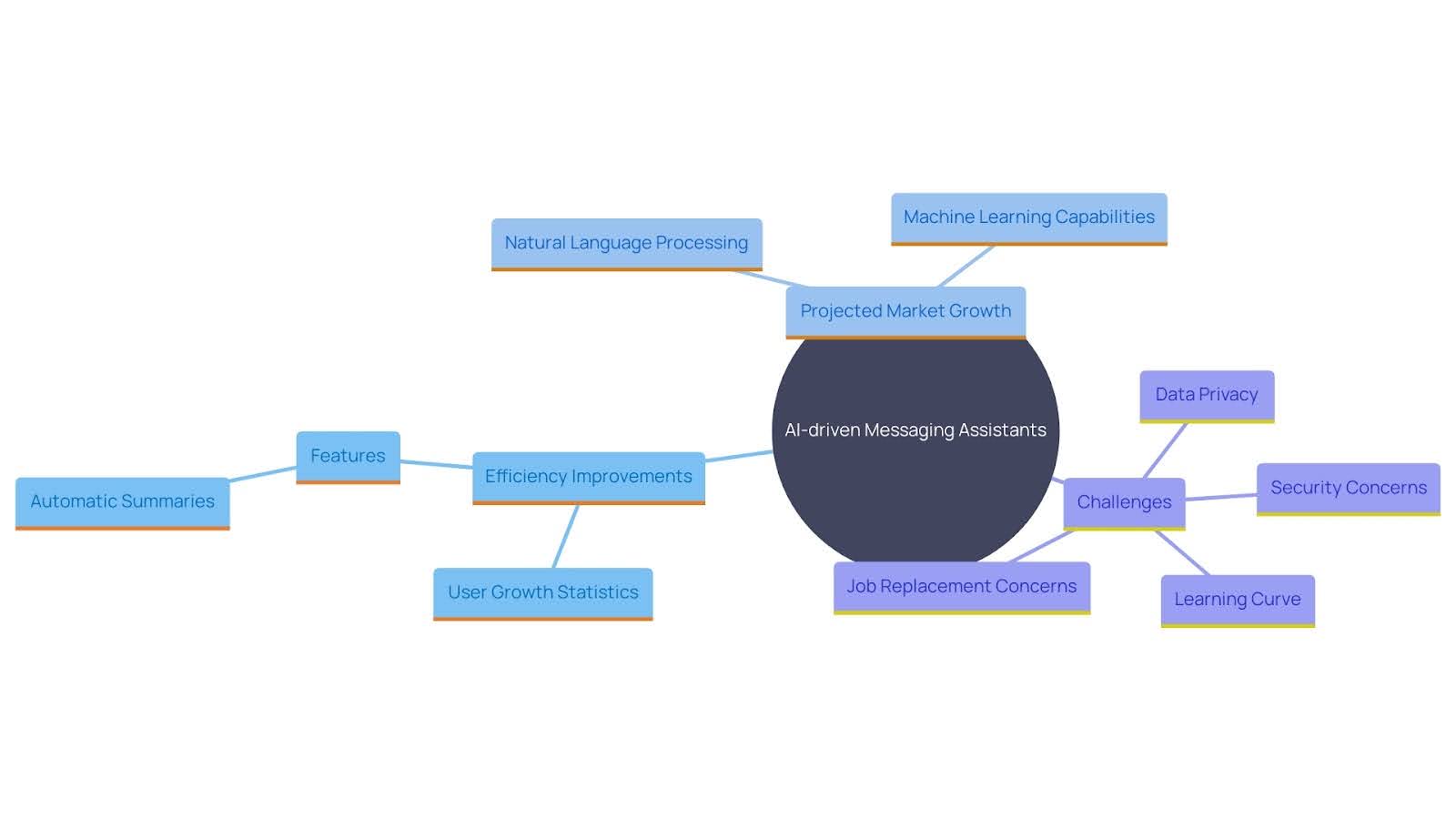
Flowrite — Streamlining workflows with AI
Flowrite excels in transforming brief notes into polished, complete communications, making it an indispensable tool for professionals who frequently draft messages quickly yet seek clarity and professionalism. Its AI-driven suggestions not only enhance the quality of communication but also ensure that the tone, reader sentiment, and clarity are meticulously refined.
You’ll have more time to do important things, like sending even more messages.
Furthermore, Flowrite’s ease of use and customization options allow users to generate unique messages effortlessly, without requiring any technical expertise. This makes it an ideal choice for anyone from busy professionals to students. Privacy and security are also prioritized, ensuring that all user information remains confidential.
The incorporation of such AI tools indicates a wider movement towards enhancing communication to be more efficient, personalized, and contextually relevant in our fast-paced digital world.
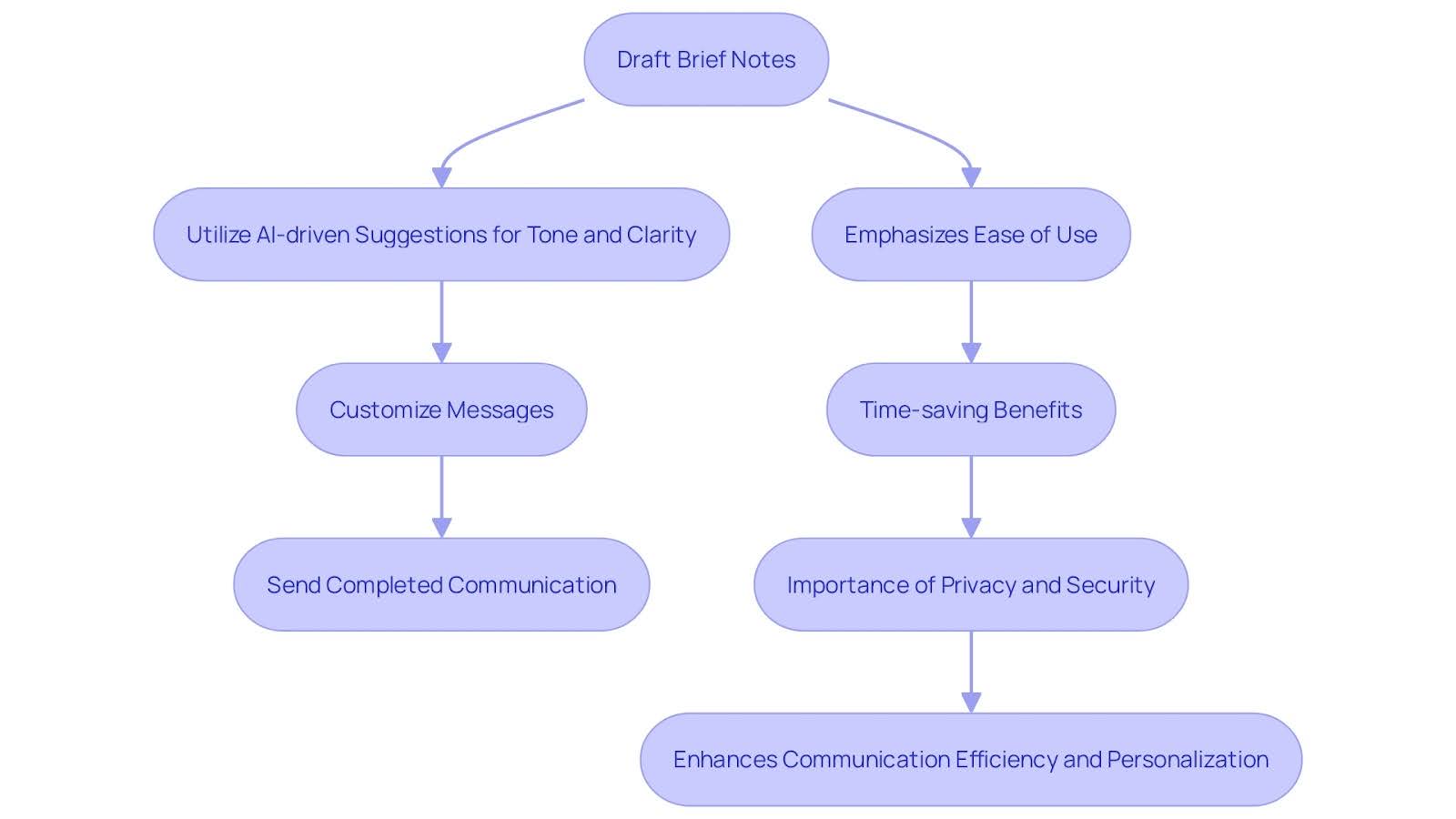
SaneBox — Best for inbox management and prioritization
SaneBox redefines how we manage our inboxes by leveraging advanced AI algorithms to filter out unimportant messages and highlight those that matter most. In a world where over 361 billion messages are sent and received daily, this functionality is essential for cutting through the clutter and concentrating on priority communications.
By examining your messaging habits, SaneBox guarantees a more organized and effective interaction experience, lessening the tension linked to message overload. This intelligent system not only organizes and highlights important information but also seamlessly integrates with other AI tools, creating a cohesive digital workspace.
As AI continues to transform message management, it provides a more intelligent, tailored method to manage digital communication, guaranteeing that the most pertinent information always stands out. The future of messaging is not just about managing inboxes but enhancing the way we connect in this digital age.
Superhuman — Speed-focused AI email assistant
Superhuman excels in transforming message management through speed and efficiency, featuring keyboard shortcuts and AI-assisted replies. This sophisticated AI system surpasses simple automation, greatly minimizing the duration users dedicate to messages. Based on recent research, AI users at a consumer goods firm invested 31% less effort on messages, conserving roughly 50 minutes each week. The telecommunications sector also saw a 23% reduction in time spent, equating to 40 minutes saved weekly. With features like Summarize, Superhuman ensures that users can quickly grasp the essence of lengthy message threads, thereby minimizing inbox overload and enhancing productivity.
The incorporation of AI into messaging platforms like Superhuman signifies a fundamental change in digital communication. It provides a cohesive digital environment where messages are not merely handled but enhanced for productivity. New AI-powered updates, such as those seen in Yahoo Mail, introduce features that organize, summarize, and highlight crucial information, ensuring users stay on top of their tasks effortlessly.
Moreover, Superhuman’s AI capabilities extend to delivering messages at optimal times, sharing availability directly from the inbox, and automatically drafting entire communications. These characteristics remove the repetitive exchanges usually linked with message correspondence, making it a strong asset for professionals handling large quantities of messages without sacrificing quality. The advancement of electronic messaging through AI is a testament to how technology can redefine communication tools, making them more secure, personalized, and contextually relevant.
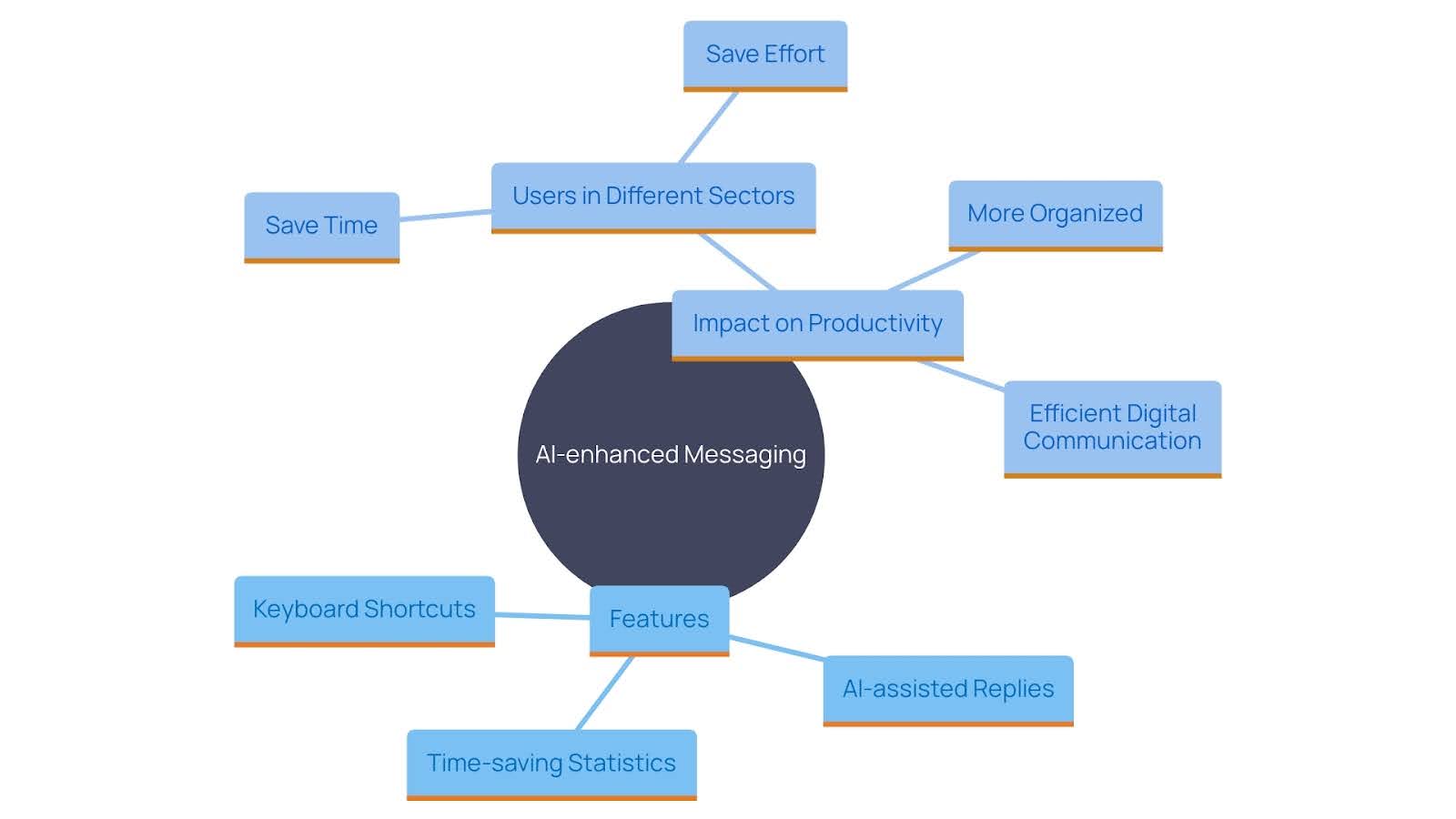
Lavender — Personalized email suggestions and insights
Lavender provides tailored communication suggestions based on the particular context of your discussions, greatly improving the efficiency of sales teams.
By utilizing AI-driven insights, Lavender assists in creating messages that connect with recipients, resulting in increased engagement and conversion rates.
A case in point is the impressive performance metrics reported by users: a 42% increase in replies, a 200% boost in meetings booked, and a 300% surge in pipeline within two months of implementation. These results emphasize Lavender’s capability to convert outreach through messaging into a more impactful and efficient process.
Additionally, the instrument’s integration capabilities with platforms like Gmail, Outlook, and HubSpot ensure seamless adoption and utilization. As businesses keep focusing on AI in their marketing approaches, resources such as Lavender offer a distinct route to attaining enhanced personalization and increased ROI in marketing campaigns.
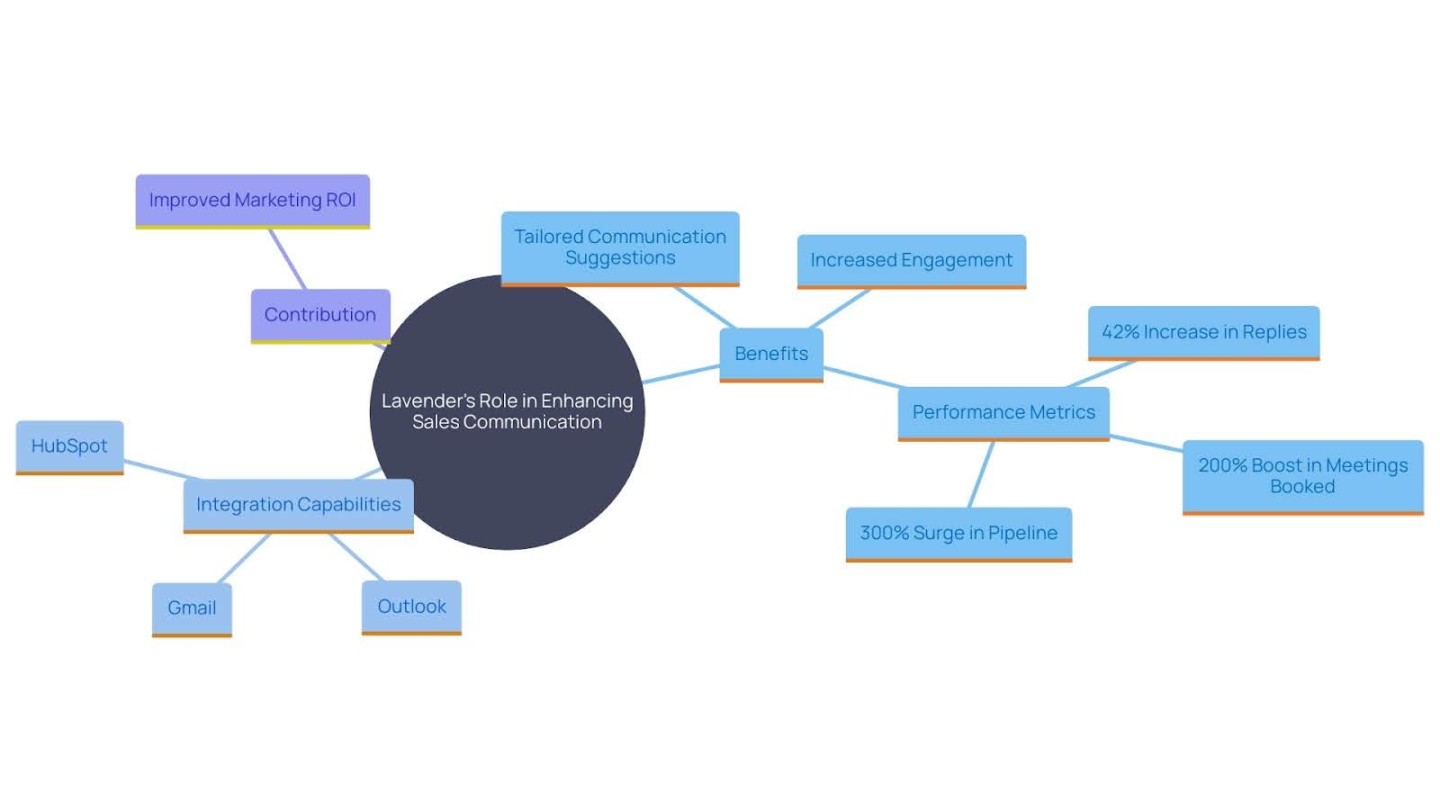
Missive — Team collaboration and AI-powered email assistance
‘Missive enhances team collaboration by incorporating AI messaging support, making it an exceptional resource for any business. By allowing teams to handle shared inboxes and assign messages seamlessly, Missive ensures that communication remains streamlined. The AI capabilities, which can draft responses and recognize tasks, are transformative.
As per the 2024 Work Trend Index Annual Report, staff utilizing AI applications such as Copilot devoted 31% less time reviewing messages, conserving up to 50 minutes each week. This efficiency not only enhances productivity but also frees staff from message overload, allowing them to concentrate on more strategic activities. Innovations like these are setting a new standard for AI-driven productivity in the workplace.
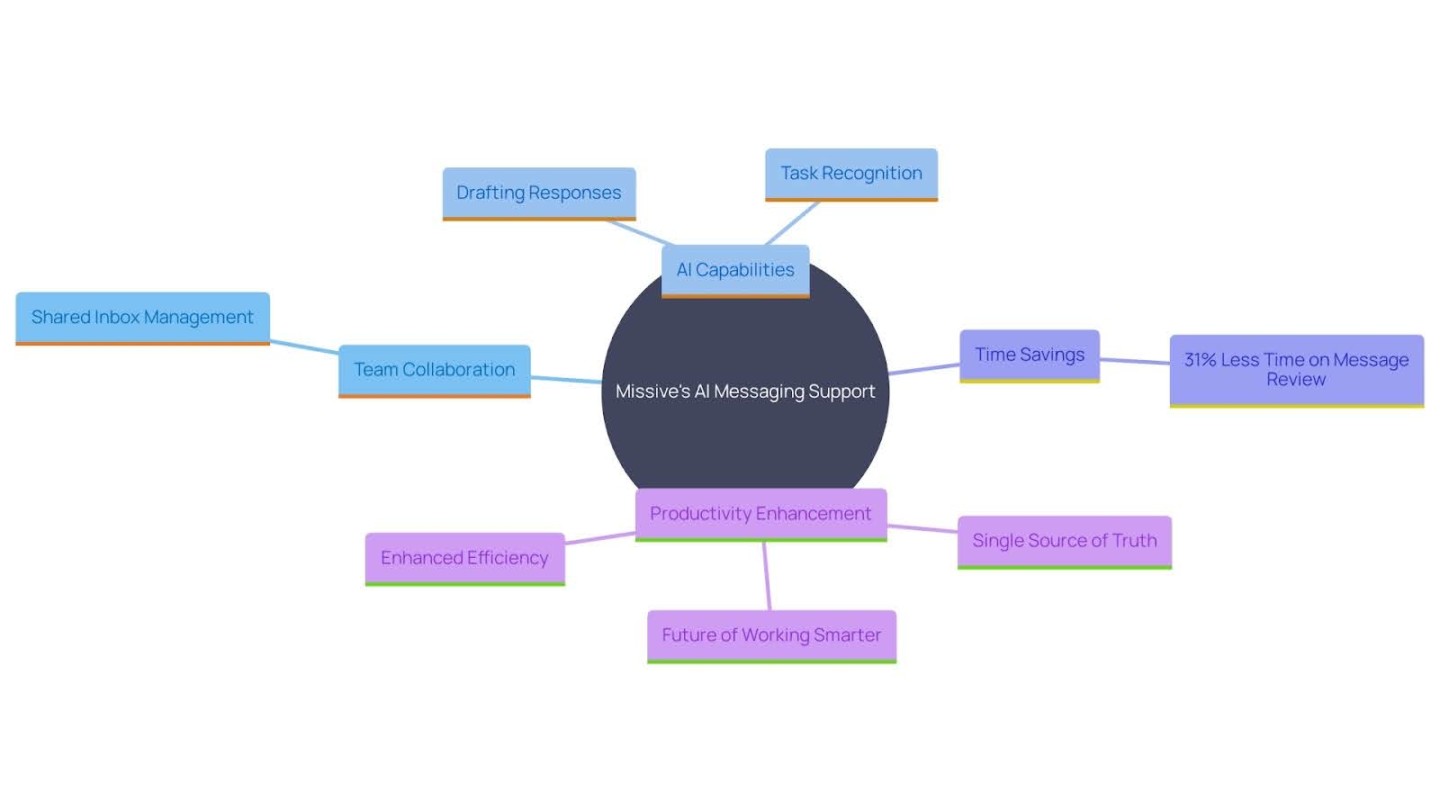
Additional AI email assistants to consider
In the domain of AI-augmented messaging, several tools stand out for their distinct functionalities. Astro, for instance, is transforming message prioritization by utilizing AI to sort and highlight the most important communications, making inbox management more efficient.
Boomerang, conversely, excels in scheduling and follow-up reminders, ensuring timely responses and structured interactions. Each of these instruments utilizes advanced AI to convert correspondence from a basic messaging platform into a clever, efficient assistant.
This shift is part of a broader trend where AI integration is not merely a technological upgrade but a fundamental change in how we engage with digital interaction tools. As highlighted by the evolution of messaging through AI, platforms like Spike are also enhancing personalization and efficiency, demonstrating how technology can redefine communication in our fast-paced, digital world.
Key features to look for in an AI email assistant
When selecting an AI email assistant, it’s important to focus on features that will truly transform your email management. Look for automation capabilities that can handle repetitive tasks, freeing up your time for more strategic activities. Ensure the assistant integrates seamlessly with your current resources to create a unified digital workspace. Compatibility across different platforms and devices is essential, as it allows you to maintain productivity whether you’re on a desktop, tablet, or smartphone.
A user-friendly interface is crucial for ease of use, while customization options enable the assistant to adapt to your specific workflow and preferences. For instance, tools like Ghostwriter can assist you in composing messages in your unique voice, and AI Autocomplete can propose completions while you type, making your communication more efficient.
Consider the assistant’s ability to provide personalized responses and summarize emails. Features like those in Yahoo Mail, which offers AI-generated summaries and proposed actions, can significantly reduce the time spent on administrative tasks. Additionally, advanced natural language processing (NLP) capabilities ensure more fluid and conversational interactions, enhancing overall user experience.
Real-world instances, such as the Shortwave AI Assistant, illustrate how these resources can enhance productivity by functioning as a personal assistant that understands your preferences thoroughly. This incorporation of AI not only simplifies message management but also guarantees that interactions stay pertinent and effective in a fast-paced digital environment.
Statistics indicate that AI tools such as Microsoft’s Copilot can decrease the time spent reviewing messages by up to 31%, conserving users considerable time each week. As AI keeps advancing, its function in improving messaging will only increase, making it an essential component of contemporary workflows.
Integrating AI email assistants into your workflow
To maximize AI assistants’ benefits, integration into existing workflows is crucial. Companies like Salesforce have embraced AI, incorporating features into Slack to streamline productivity. Dashly follows this principle by automating lead qualification, reducing response times, and ensuring that high-quality leads are nurtured effectively. Onboarding and ongoing feedback are vital to ensure these tools improve communication efficiency. Data from Dashly clients have shown a dramatic improvement in metrics, such as a 93% meeting attendance rate and significant reductions in response delays.
Continuously assessing an AI tool’s impact on productivity is necessary for long-term success. By adopting AI solutions like Dashly, businesses can see a measurable increase in operational efficiency, translating to more impactful outcomes.
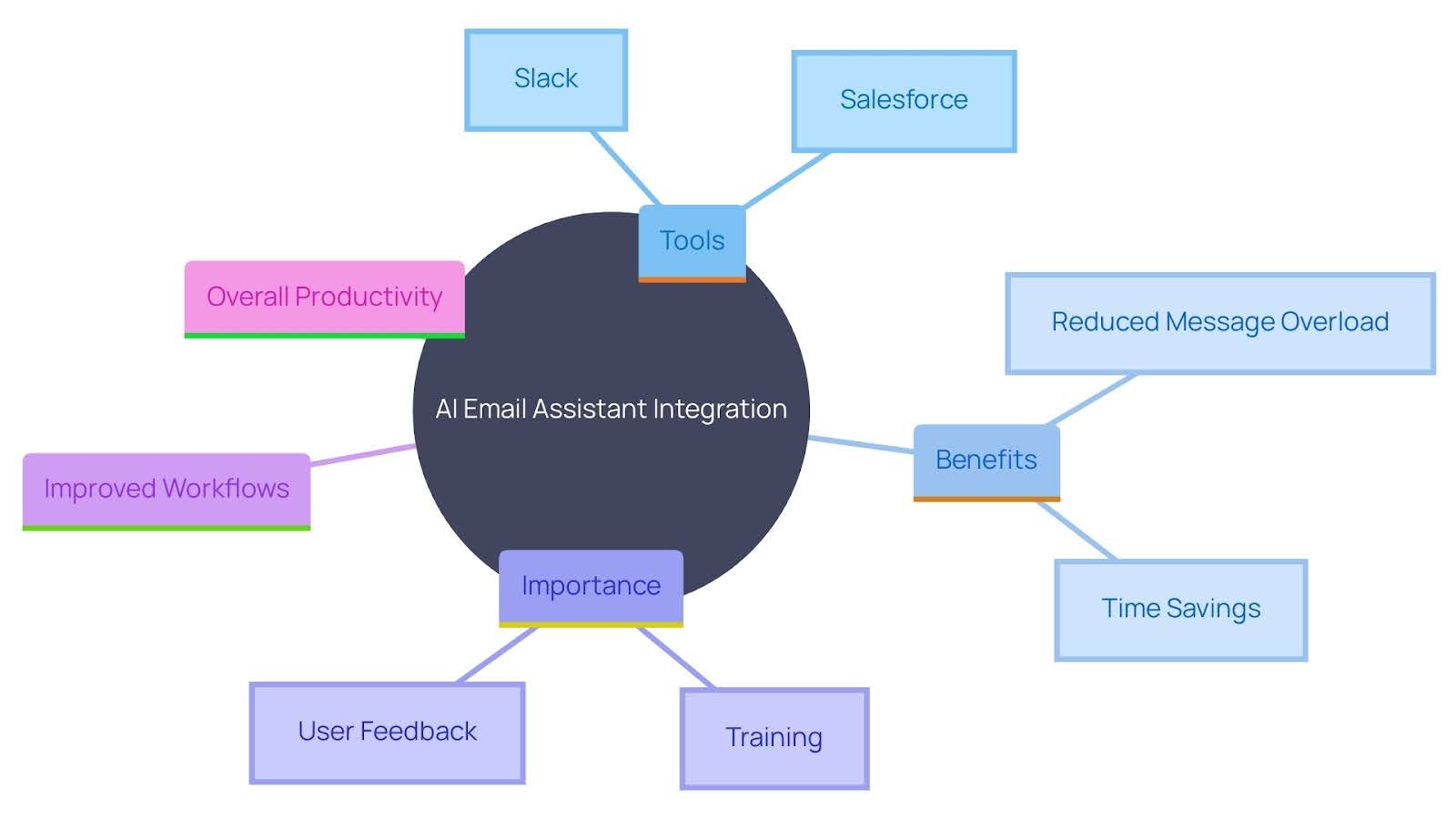
Conclusion
The integration of AI email assistants into business practices marks a significant leap forward in communication efficiency. These tools automate routine tasks and empower professionals to focus on strategic initiatives that drive value. Dashly’s innovative approach to automating lead management and scheduling has proven to deliver results, from a 99% accuracy in meeting forecasts to a 93% attendance rate. The AI assistant market’s projected growth to $242.30 billion by 2030 underscores the importance of these technologies.
Tools like SaneBox, Superhuman, and Dashly illustrate how AI can streamline email workflows, prioritize critical communications, and reduce stress from message overload. By incorporating these tools thoughtfully into workflows, businesses gain a strategic edge in today’s digital landscape. Embrace the future of communication with AI-driven solutions like Dashly and transform your productivity.
Read also: Ultimate guide to an AI sales funnel: the best tips, tools and common mistakes to avoid



